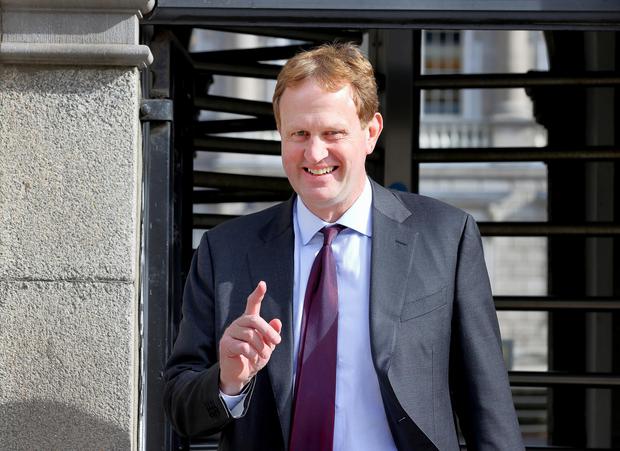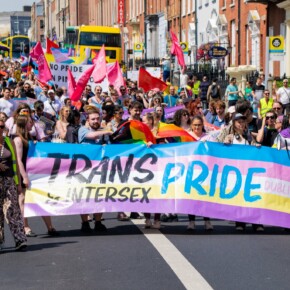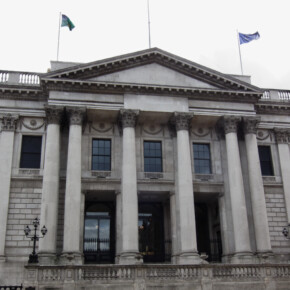Government accused of “caving to far-right” with new immigration law
Mike Finnerty 07 May 2025
Social Democrats TD and justice spokesperson Gary Gannon has accused the government of “caving to the far-right” on the immigration issue.

This week, Fianna Fáil Minister for Justice Jim O’Callaghan announced what has been dubbed the most significant change to Irish immigration law in over a decade, with O’Callaghan saying “the current international protection system is not working effectively, with decisions taking far too long.
Under the new legislation, the General Scheme of the International Protection Bill 2025 will replace the International Protection Act 2015, and the application and appeals time frame for international protection applicants will be cut from three years to three months.
In basic terms, this gives international protection applicants at risk of deportation less time to avail of legal help to plead their case to stay in Ireland.
O’Callaghan said at present, the process “takes too long and is too costly in terms of having to provide accommodation.”
The plan, which was brought before Cabinet last week, will cut down on the number of oral hearings in the asylum-seeking process, opens up the possibility of detention centres being opened and potentially gives final say on who stays in the country to officers within the International Protection system.
The new measures by the Department of Justice are consistent with the new government’s stance on cracking down on immigration; last week, 39 people were deported to Georgia on a chartered flight.
“Stepping up enforcement and securing our borders is a central commitment of mine; swift and fair returns of people whose applications have been refused is the foundation of any modern rules-based immigration process,” O’Callaghan said this week.
“If people wish to move to Ireland, they must do so using the appropriate legal pathways. Removal operations send a clear message that our laws are to be respected and underscores this government’s intention to protect the integrity of our immigration system.”
Earlier this year, O’Callaghan told RTÉ, “too many people are coming to Ireland seeking international protection who are not entitled to international protection.”
In January, 80% of application claims for international protection were rejected, a stat which O’Callaghan defended.
“We have to have a procedure which recognises that if you come in and you’re granted international protection, you stay, you’re welcome; if you come in and you refuse international protection, you leave, you’re gone.”
The government’s new stance on immigration has rankled Gannon, the Social Democrats’ spokesperson on justice, home affairs and migration.
“We’re all in agreement that Ireland needs a far more efficient asylum process, but that doesn’t mean it should have cruelty baked in,” the Dublin Central TD said.
“This legislation is not about fixing what is broken – it is about chasing headlines, caving to far-right pressure, and abandoning our obligations to basic fairness and human rights.”
Gannon said that Minister O’Callaghan has provided “no roadmap” about improving staffing levels in the International Protection Office, or the Appeals Tribunal.
“This announcement is nothing but pandering,” he commented.
“Both bodies are suffering from significant backlogs – when under political pressure, scapegoating the vulnerable when you’ve no viable solutions is the oldest trick in the book.”
The three-month deadline for asylum decisions “prioritises bureaucratic speed over human fairness,” according to Gannon.
“International protection claims involve trauma, persecution, and complex histories. Arbitrary deadlines will inevitably lead to rushed, wrongful refusals – and the real risk of deporting people back into danger.”
“The proposal to limit oral hearings strikes at the heart of fair process – oral hearings are essential for many applicants who cannot fully tell their stories through paperwork, particularly those facing trauma, language barriers, or mistrust.”
Gannon expressed concern that “removing this safeguard will mean more unjust outcomes” within the Irish immigration system.
“Handing direct deportation powers to protection officers removes a crucial layer of democratic oversight – deportations must remain politically accountable decisions.”
In recent weeks, both Gannon and fellow Dublin Central TD Marie Sherlock have criticised the government for the treatment of Ukrainian refugees in Dublin 1.
In February, Ukrainian refugees in the Hubble Student Accommodation facility in Mayor Street in Dublin 1 were given just six days’ notice of their move to an equestrian centre in Kill in Co. Kildare.
Of the 240 Ukrainians at the site, there are 49 school students and 77 in employment.
At the time, Labour TD Sherlock called the move “inhumane and unbelievable.”
“This is shocking treatment of refugees who have set down roots in our community in Dublin 1, and far below the standards we should expect from the government. It is utterly symbolic of the shotgun nature of the moves by the Department,” she said.
Following pressure from Sherlock and Gannon, along with locals, the timetable for the move was eventually pushed out, with more notice given to people at the Dublin 1 accommodation.
Local Fine Gael TD Naoise Ó Muirí said that families from Ukraine “need to be able to plan for their future, even in the short term.”
The recent shift in the Russia-Ukraine war, which has seen the Russian army make advances through Ukraine and the actions of Donald Trump indicating a shift in American support for the war, led to the Dublin Bay North TD saying “many Ukrainians who have come to these shores are facing deep uncertainty; these people deserve some stability for the months ahead.”
“Families across Ireland have opened their homes in an extraordinary act of humanity and social solidarity. They deserve the reassurance that their generosity is not being taken for granted,” he said.
After leaving office last year, former Taoiseach Varadkar was directly quoted as saying that immigration levels in Ireland have “risen too quickly.”
“A country of 5 million people seeing its population rise by 2% a year, which is what’s happening at the moment, is too fast.”













